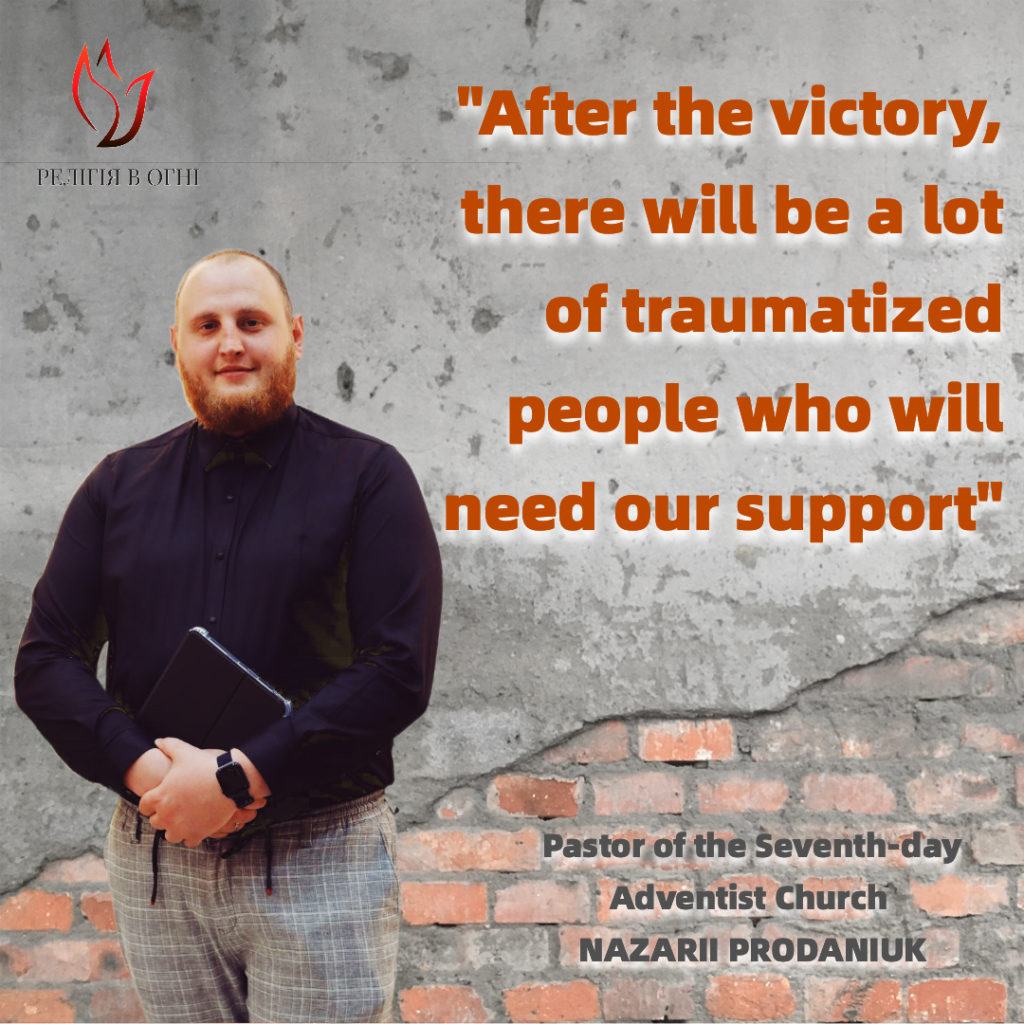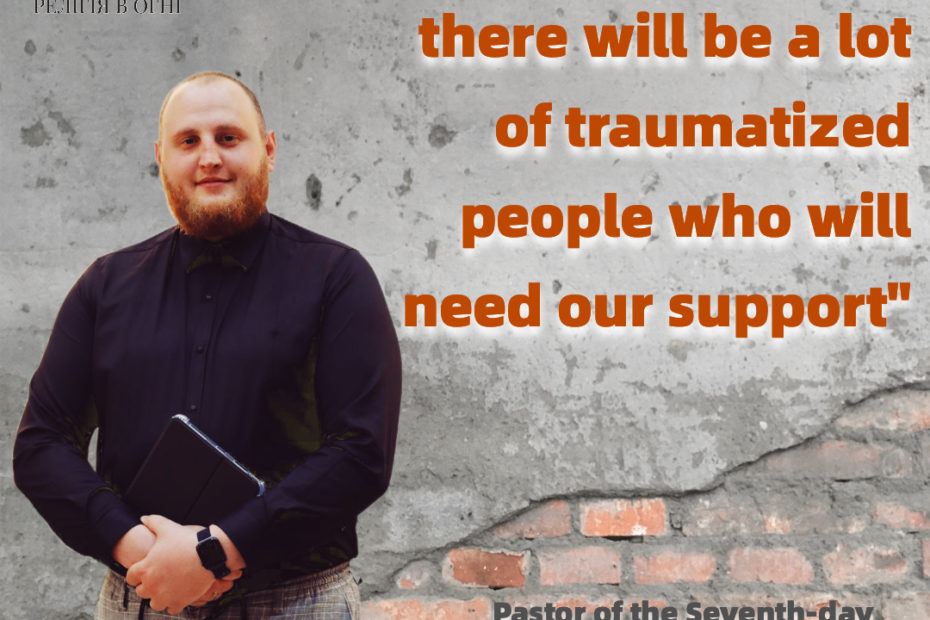
Kherson, the administrative center of the region, became one of the Russian “trophies” after the beginning of the full-scale invasion of Ukraine. After almost 9 months of occupation, the Armed Forces of Ukraine managed to liberate the city and push the enemy away from the right bank of the Kherson region. However, it is difficult to call these areas safe, due to constant shelling from various types of weapons and mined areas and buildings. On June 6, 2023, the Russian military blew up the dam of the Kakhov reservoir, which led to a large-scale environmental disaster with human casualties. Nazarii Prodaniuk, pastor of the Second Adventist Community of Kherson, chaplain of the school DieSlovo, told us about life in the occupation, evacuation of the population, activities of the Adventist community during the war and the future of Ukraine.
– Tell us about your activities before the full-scale invasion of the Russian army into Ukraine?
– I lived with my family in the city of Kherson, served as a pastor and was engaged in educational activities as a chaplain of DieSlovo school. Our community, about 130 people, has its branch in the Shumensk district of the city. The Christian school DieSlovo is also located there with about 80 children. We worked, we served. We had a youth church based in our community. We did various projects to support socially vulnerable groups of people.
– Did the war catch you in Kherson?
– The war caught us in Kherson. On the morning of February 24, the principal of the school called me and said: “Nazarii, the war has begun!”. I didn’t want to believe it until the end, the prerequisites were there, but I refused to believe it. I could not understand how there could be a war in the 21st century, it is unreal. Can we go back a century? But now we see what happened! I always thought that I would have time to save my family. I have a wife and two daughters. But it turned out as it did. The war started and we rushed to help people. A lot of people asked: “What should we do? Should we leave or not? How long will it last?”. I think you remember those notorious “two or three weeks”. Although, I remember how they asked me on the first day and I said that “it won’t be long, think twice whether it’s worth leaving.” But on the second day, I realized that it was better to leave the occupied territories.
– And how did the events unfold further?
– Then we took care of the documentation of our school and church, because we were ready that the Russians would come for us. We realized that we were in a deep occupation. I realized that I couldn’t take my family out, and at that moment, it wouldn’t be the right decision. Therefore, they decided to engage in humanitarian aid: we collected funds, bought groceries, and distributed them. There was a period when we were asked to organize the evacuation, but there were problems with that. Because there was a situation when civilian convoys were simply shot. That’s why we didn’t engage in it at the beginning. But, after about a month and a half of occupation, we managed to organize the first departure. We found a relatively safe route, and my family went in the first column, together with about 30 people from our Adventist community. I deliberately stayed in Kherson, because it was not possible to evacuate everyone at once. We took out the maximum number of people: everyone who wanted to leave. We took out not only our church members, but also young people and students who turned to us for help. People phoned literally from early in the morning until late at night, asking for help to evacuate. But later our resources ran out, there were no more cars or drivers. We took people out only by private vehicles. Cars were searched all over the city, as well as drivers.
– Do you have information on how many Adventists remain in Kherson? I mean, the people who refused to evacuate at all.
– There are three Adventist communities in Kherson. I can only provide information on my own. Of the 130 members of the church, about 25-30 people remained in the city. These people made such a decision for themselves and refused to leave their home despite the danger. As they say, “I was born here, I will die here.” Personally, I also did not want to leave for some time, but the circumstances forced me to. One of the reasons is that I was born in Frankivsk Oblast, I got my passport in Lviv Oblast, and it was registered in Odesa Oblast. When we found ourselves under occupation, the Russian military began to check documents and to set up roadblocks. This became a very big problem. Immediately there were accusations in my direction, such as “Banderivets” or the like.
– Were there accusations from the Russian military regarding your religious activities? Did they even know your religion\us affiliation?
– They did not know I was an Adventist pastor. When we were under occupation, I hid my minister’s certificate and did not give them such information. For one simple reason: we knew that if this became known, searches would begin in the communities, which was both unnecessary and dangerous. We do not know how and what exactly they can interpret from what they would have found during the searches.
– We know about various cases during the evacuation of civilians from the occupied territories, unfortunately, there are many tragic stories. Were your evacuation trips successful?
– Yes, God accompanied our convoys and everyone left successfully. We act as a united Church, so all stories of evacuation and subsequent accommodation of people are successful. We took people to Mykolaiv or Odesa, and from there our church buses, with the support of the ADRA charitable organization, took all those who wanted to go abroad, and the places for people to settle and live were already prepared. Not a single evacuee from the Adventist community was left without support and necessary help, at least for the first time. Everyone was helped not only to leave the occupation, but also to settle in a new city.
– What is known about the buildings of the Church or DieSlovo school in Kherson?
– The Lord has saved our buildings. It turned out that from the first days of the occupation, we decided to make a humanitarian aid headquarters on the territory of DieSlovo school, which is one of the community centers in Kherson. And it was a certain risk, because the occupiers did not really like volunteers and their activities. We had a case when the Russian military came to the school gates on Tigers, stood for a few minutes examining everything, and then turned around and left. Since that moment, they have not come to any of our buildings. Not a single building (as of June 1, 2023 – editor’s note) of the Adventist church in the city of Kherson was damaged by the occupiers.
– What is happening now with your community in Kherson? Has anyone returned after de-occupation, how are the services held and are they held at all?
– After leaving the city, the community remained active, gathering in small numbers. Among those who remained was a presbyter who served the community. Following the de-occupation of the Kherson region, I, as a pastor, made efforts to visit and conduct community services once or twice a week. However, I have not yet brought my family back. We promptly reopened the citizens’ support center, providing essential supplies such as food packages, clothing, blankets, pillows, and flashlights. At that time the Kherson region was without any heating or electricity, these resources were greatly needed. Additionally, we installed Starlink to ensure accessible internet connectivity for the people. Around one and a half month after the region was de-occupied, we launched a program specifically designed for children and teenagers from the Kherson region. We understood that children who had spent a significant amount of time in the midst of armed conflict, hearing shelling and witnessing battles, particularly needed psychological support and assistance. The program, named Let’s Go Together, offered an engaging and educational experience. Every week, on Saturdays, approximately 50 young people would visit us, and our aim was to support them through entertainment, celebrations, and gift-based games..
– Are these children’s parents members of the Adventist community?
– Including them, but we welcomed all children from Kherson and the Kherson region who wanted to participate. We were happy to have everyone. We received very positive feedback from parents that their children enjoyed it and they are looking forward to the next weekend to participate in the program again.
– As you mentioned, the community did not cease its activities. What happened to your educational center – school DieSlovo?
– The school continued its operations online, so almost all children continued their studies. Of course, some school children fled abroad, took their documents, and transferred to other schools. On the other hand, we also have children who joined our school this year and are successfully studying. Currently, they are studying exclusively online, but we believe that we will return to the regular format very soon. In fact, we plan to install a new playground for children during the summer.
– Unfortunately, the occupiers continue to shell the city of Kherson even after its de-occupation. On June 6, 2023, a horrific war crime was committed when the Kakhovka Hydroelectric Power Station was blown up. As a result, parts of the city and many villages in the Kherson region were flooded. What is the situation in your community?
– The neighborhood where our community buildings are located was not flooded. However, we actively engaged in serving everyone affected from the early days after the explosion: we were distributing food packages, providing humanitarian assistance. Since the water level has subsided and people have started returning to their homes, we are involved in water pumping and drying out the premises.
– I would like to learn your predictions for the future. How will your Adventist community in Kherson function after Ukraine’s victory in the war? And overall, what is the future of Ukrainian religiosity?
– It seems difficult to find an atheist now. Currently, everyone is praying, because they realize the importance of the Lord on both the front lines and at home. I am aware that after our victory, we will have many traumatized people in need of support. And this task is not only for our Adventist church. It is the task for every religious community in Ukraine, to support those in need: the military returning from the front lines, people who have lost loved ones during the war, those who have lost their homes. We must become an ‘island of peace’ for such people, where they can feel support and gratitude for what they have done or are doing. We will also have a period of intensified work with children, with the future generation, to explain what has happened, what we should do now, and what future scenarios await us. Overall, the period after victory will be a time of growth and service for our community and the majority of Ukrainians, a time when we will be united and strong. Just as we were united at the beginning of the war with a shared idea of peace and victory, that was our strength. I am convinced it will be a joyful time!!
Nazarii Prodaniuk talked to Ulyana Sevastiyaniv.
The interview was conducted as part of the project Religion on Fire: Documenting Russia’s War Crimes against Religious Communities in Ukraine, implemented by the NGO Workshop of Academic Study of Religions.
